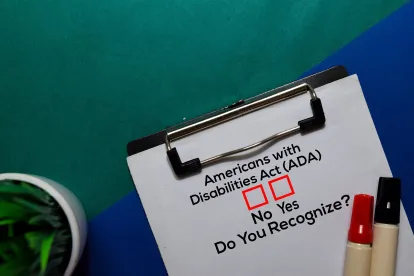Most employers in Texas are likely aware that the Americans with Disabilities Act (ADA) and the Texas Commission on Human Rights Act (TCHRA), which is similar to the ADA, protect most job applicants and employees from discrimination, harassment, or retaliation based on disability. In most parts of the country, courts have not considered obesity as a disability unless it is caused by an underlying health condition. In Texas, however, courts have reached a different conclusion, holding that obesity in itself may be a disability in some cases.
Quick Hits
-
Obesity may in itself be considered a disability by Texas courts under the Americans with Disabilities Act and the Texas Commission on Human Rights Act even absent evidence of an underlying health condition.
-
Employers may want to ensure all anti-discrimination training notes that obesity is a potential disability that may need to be accommodated.
-
Employers may also want to review job postings and job descriptions to ensure they accurately describe the physical requirements of each position and ensure job applications ask whether the applicant is able to perform the essential functions of the job.
Brief Synopsis of the ADA and TCHRA
The ADA and TCHRA protect a qualified individual with a disability against discrimination based on the individual’s disability. A person is qualified if he or she can perform the essential functions of the position with or without a reasonable accommodation. A disability is (1) a physical or mental impairment (i.e., “any physiological disorder, cosmetic disfigurement, or anatomical loss affecting one or more … body systems,” whether permanent, temporary, or episodic) that substantially limits one or more major life activities; (2) a record of such an impairment (i.e., a prior history of a mental or physical impairment); or (3) being “regarded as” having an impairment (i.e., a perceived disability). The ADA prohibits discrimination, harassment, and retaliation based on an individual’s disability or disability-discrimination complaint in job application procedures, hiring, advancement, discharge, compensation, job training, and other terms, conditions, and privileges of employment.
Obesity as a Disability
At least eight federal courts and many state courts throughout the United States have considered this issue and held that obesity is not a physical impairment unless it is the symptom of an actual or perceived underlying physiological disorder or condition. However, two Texas state courts have opined that obesity alone—even in the absence of an underlying physiological disorder or condition—may be an actual or perceived disability.
The Texas line of cases starts with Morrison v. Pinkerton Inc., handed down by the First District Court of Appeals of Texas (Houston) in 1999. Although the court in that case ultimately held that the employee had failed to present enough evidence to succeed on his disability discrimination claim, the court opined that (1) obesity can be a physical impairment if it ‘“substantially limited [the employee] in a major life activity,’” and (2) obesity can be a perceived disability if the employer “regard[s] … ‘the obesity as a disorder that substantially limited him in a major life activity.’”
On January 31, 2022, in Texas Tech University Health Sciences Center-El Paso v. Niehay, the Eighth District Court of Appeals of Texas (El Paso) considered the case of Dr. Lindsey Niehay. Dr. Niehay was an emergency medicine resident who alleged that she was unlawfully discriminated against because her morbid obesity was regarded as a disability. The discrimination started when one of Dr. Niehay’s supervising physicians reported that she struggled with a procedure because of her “body habitus.” The supervisor commented that Dr. Niehay “was sweating profusely, dyspneic and had to take multiple breaks because of her inability to stand and at times bend over to gain the best access [to the patient].” Despite another supervisor reporting that Dr. Niehay had performed well during a long procedure and had “good potential,” the residency program director sought to discipline Dr. Niehay “due to patient safety concerns.” After consulting in-house legal counsel, who advised against disciplining Dr. Niehay because of her weight, the university suspended Dr. Niehay citing deficiencies in evaluating patients, developing patient treatment plans, and competently performing procedures, as well as lacking interpersonal and communication skills, professionalism, or a “commitment to ‘excellence.’”
Following the court’s logic in Morrison, the El Paso court held that, under the TCHRA, Dr. Niehay was not required to show that her employer believed the perceived impairment arose from a physiological cause. Instead, morbid obesity can be considered a physical impairment in a “regarded as” claim if Texas Tech viewed her as being impaired from her morbid obesity. The court further opined that the evidence showed that Texas Tech viewed Dr. Niehay’s weight to be an impairment and terminated her residency for pretextual reasons.
Although the U.S. Fifth Circuit Court of Appeals has not opined on this issue, several federal district courts in the Fifth Circuit have in Equal Employment Opportunity Commission v. Texas Bus Lines (Texas, 1996); Melson v. Chetofield (Louisiana, 2009); Lowe v. American Eurocopter, LLC (Mississippi, 2010); and Equal Employment Opportunity Commission v. Resources for Human Development, Inc. (Louisiana, 2011). The courts in all of these cases held that obesity can be an actual or perceived disability under the ADA, even absent an underlying physiological disorder or condition.
Key Takeaways
Based on the state and federal cases discussed above, obesity may be a disability under the ADA and TCHRA. As such, employers may want to (1) ensure that all anti-discrimination training notes that obesity is a potential disability that may need to be accommodated, and (2) review job postings and job descriptions to ensure they accurately describe the physical requirements of each position and ensure job applications ask whether the applicant is able to perform the essential functions of the job.




 />i
/>i
